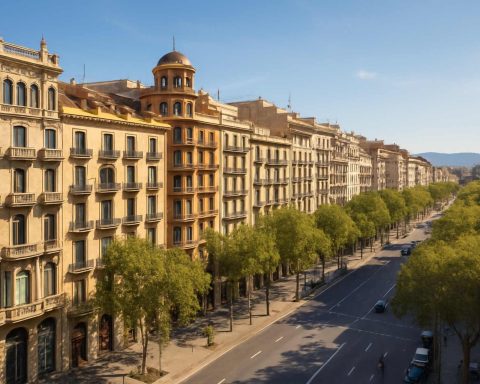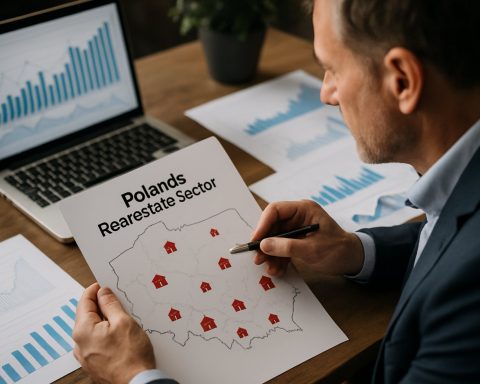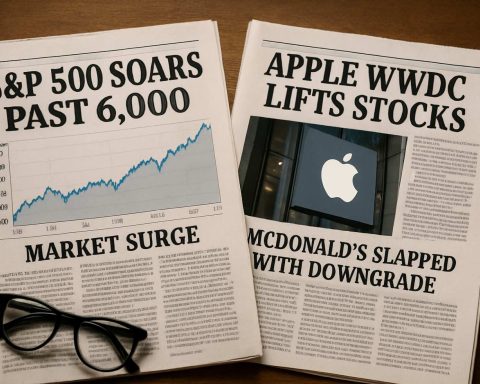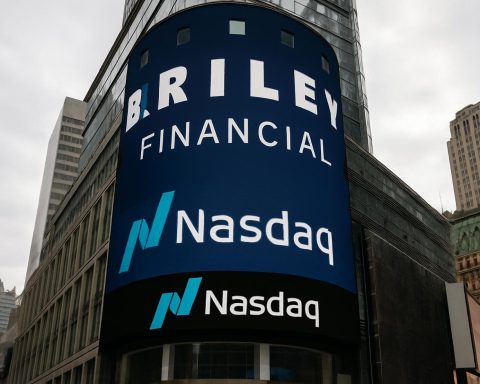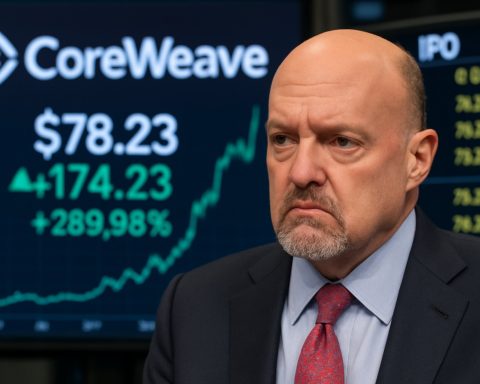Barcelona Property Market Unveiled: Soaring Values, Emerging Hotspots, and What Lies Ahead
- Market Overview
- Technology Trends Shaping Real Estate
- Competitive Landscape and Key Players
- Growth Forecasts and Investment Potential
- Regional Analysis: Neighborhoods in Focus
- Future Outlook for Barcelona’s Property Sector
- Challenges and Opportunities in a Dynamic Market
- Sources & References
“Barcelona’s property market is on fire in 2025 – prices have hit record highs and apartments are vanishing from the market in mere hours euroweeklynews.com.” (source)
Market Overview
Barcelona’s real estate market is poised for a significant boom in 2025, driven by surging demand, limited supply, and renewed international interest. After a period of stabilization post-pandemic, property prices in the city have reached record highs, with the average price per square meter surpassing €4,500 in central districts as of early 2024 (Idealista). This upward trend is expected to continue, with analysts forecasting a further 5-7% increase in 2025, outpacing most other Spanish cities (Expansión).
- Hotspots: The most sought-after neighborhoods include Eixample, Gràcia, and Sarrià-Sant Gervasi, where luxury apartments and modernized historic properties are in high demand. The waterfront district of Poblenou, part of the city’s “22@” innovation district, is also attracting tech professionals and investors, with prices rising over 8% year-on-year (ABC Economía).
- International Buyers: Foreign investment is rebounding, particularly from French, German, and American buyers, who now account for over 20% of all transactions in prime areas. The city’s lifestyle, connectivity, and relative affordability compared to other European capitals continue to drive this trend (Savills).
- Rental Market: Rental prices are also climbing, with a 10% year-on-year increase reported in 2024. The average monthly rent in central Barcelona now exceeds €1,300, and supply remains tight due to regulatory constraints and high demand from both locals and expatriates (El Periódico).
Future Forecasts: Looking ahead, experts predict continued price growth through 2025, albeit at a slightly moderated pace as new construction projects come online and government policies aim to balance affordability. However, the city’s enduring appeal, robust economic fundamentals, and limited developable land suggest that Barcelona will remain a European real estate hotspot for the foreseeable future (Knight Frank).
Technology Trends Shaping Real Estate
Barcelona’s real estate market is poised for a significant boom in 2025, driven by a confluence of technological innovation, international investment, and shifting urban dynamics. As the city cements its status as a European tech and lifestyle hub, property prices are reaching record highs, with certain districts emerging as clear hotspots for both residential and commercial investment.
Record Prices and Market Dynamics
- According to Idealista, Barcelona’s average property price surpassed €4,300/m² in early 2024, a 7% year-on-year increase, and is projected to exceed €4,600/m² by mid-2025.
- Prime neighborhoods such as Eixample, Sarrià-Sant Gervasi, and Gràcia are leading the surge, with luxury apartments in Passeig de Gràcia fetching over €10,000/m² (Expansión).
- Commercial real estate is also thriving, with tech companies and startups fueling demand for flexible office spaces, particularly in the 22@ innovation district (Savills).
Technology Trends Driving Growth
- Proptech adoption is accelerating, with AI-powered platforms streamlining property searches, virtual tours, and digital transactions (Iberian Property).
- Smart home integration and energy-efficient retrofits are increasingly standard, as buyers prioritize sustainability and digital connectivity.
- Blockchain-based property registries and tokenized real estate investments are gaining traction, attracting a new wave of international investors seeking transparency and liquidity.
Future Forecasts
- Analysts predict continued price growth through 2025, albeit at a slightly moderated pace as supply constraints and affordability concerns emerge (Knight Frank).
- Urban regeneration projects, such as the transformation of the Sagrera area and expansion of green spaces, are expected to create new investment opportunities and enhance livability.
- Barcelona’s appeal to digital nomads and remote workers will further diversify demand, especially for flexible, tech-enabled living spaces.
In summary, Barcelona’s 2025 real estate boom is underpinned by robust technological adoption, record-breaking prices, and a dynamic urban landscape, positioning the city as a leading European property market for years to come.
Competitive Landscape and Key Players
The Barcelona real estate market is experiencing a significant boom as it heads into 2025, marked by record property prices, surging demand in key neighborhoods, and a dynamic competitive landscape. According to Idealista, Barcelona’s average residential property prices reached an all-time high of €4,400 per square meter in early 2024, representing a year-on-year increase of 7.2%. This upward trend is expected to continue into 2025, fueled by limited housing supply, robust foreign investment, and the city’s enduring appeal as a global lifestyle destination.
Key Hotspots and Demand Drivers
- Eixample: The district remains the epicenter of luxury and mid-range property transactions, with prices surpassing €6,000 per square meter (Expansión).
- Gràcia and Sant Martí: These neighborhoods are attracting younger buyers and tech professionals, driven by new developments and improved amenities.
- Ciutat Vella: Despite regulatory pressures on short-term rentals, demand for historic apartments remains strong among international investors.
Competitive Landscape and Key Players
- Lucas Fox: A leading luxury real estate agency, Lucas Fox has expanded its portfolio in Barcelona, targeting high-net-worth individuals and foreign buyers (Lucas Fox).
- Engel & Völkers: This global brokerage continues to dominate the premium segment, leveraging its international network to attract overseas clients (Engel & Völkers).
- Servihabitat: As one of Spain’s largest property managers, Servihabitat is focusing on new-build projects and bank-owned assets, catering to both investors and first-time buyers (Servihabitat).
- Local Developers: Firms like Neinor Homes and Aedas Homes are ramping up construction to meet demand, particularly in the city’s outskirts and emerging districts.
Future Forecasts
Analysts predict continued price growth in 2025, albeit at a slightly moderated pace due to potential interest rate adjustments and regulatory interventions. The market is expected to remain highly competitive, with international capital, digital nomads, and local demand shaping the next phase of Barcelona’s real estate evolution (Savills).
Growth Forecasts and Investment Potential
Barcelona’s real estate market is poised for a significant boom in 2025, driven by robust demand, limited supply, and a surge in international investment. According to the latest data from Idealista, property prices in Barcelona reached a record average of €4,400 per square meter in May 2024, marking a 7.2% year-on-year increase. Analysts project that this upward trajectory will continue into 2025, with forecasts suggesting price growth of 5-8% across prime districts.
Several factors are fueling this boom. The city’s status as a tech and innovation hub, coupled with its appeal to digital nomads and remote workers, has intensified demand for both residential and commercial properties. The Savills European Cities report highlights Barcelona as one of the top investment hotspots for 2025, citing its strong rental yields (averaging 5.1% in central neighborhoods) and a steady influx of foreign capital, particularly from the US, Germany, and the Middle East.
- Hotspots: The Eixample, Gràcia, and Poblenou districts are leading the surge, with price increases of up to 10% in the past year. Poblenou, in particular, is benefiting from the 22@ innovation district, attracting tech firms and young professionals (Knight Frank).
- Luxury Segment: The luxury market is also thriving, with high-end properties in Sarrià-Sant Gervasi and Pedralbes fetching over €8,000 per square meter. Demand for penthouses and sea-view apartments remains exceptionally strong.
- Rental Market: Rental prices have climbed by 9% year-on-year, with average monthly rents now exceeding €1,300. The city’s strict rental regulations have constrained supply, further pushing up prices (Expansión).
Looking ahead, investment potential remains high. The combination of limited new construction, ongoing urban regeneration projects, and Barcelona’s global appeal is expected to sustain price growth and rental demand through 2025 and beyond. Investors are advised to focus on emerging districts and value-add opportunities, as the city cements its position as one of Europe’s most dynamic real estate markets.
Regional Analysis: Neighborhoods in Focus
Barcelona’s 2025 Real Estate Boom: Record Prices, Hotspots and Future Forecasts
Barcelona’s real estate market is poised for a record-breaking year in 2025, with property prices reaching historic highs and several neighborhoods emerging as investment hotspots. According to the latest data from Idealista, the average price per square meter in Barcelona surpassed €4,500 in early 2024, marking a 7% year-on-year increase. Analysts project that this upward trend will continue into 2025, driven by strong demand, limited supply, and the city’s enduring appeal to both domestic and international buyers.
- Eixample: The iconic Eixample district remains the city’s most sought-after area, with prices exceeding €6,000/m² in prime locations. Its central location, modernist architecture, and vibrant lifestyle continue to attract affluent buyers and investors (Expansión).
- Gràcia: Known for its bohemian charm and community feel, Gràcia has seen prices rise by over 8% in the past year. Young professionals and families are drawn to its pedestrian streets and cultural offerings.
- Poblenou: Once an industrial zone, Poblenou is now a tech and innovation hub. The “22@” district’s transformation has led to a surge in new developments, with prices climbing to €5,000/m² and above (ABC Economía).
- Sants-Montjuïc: This area is gaining traction due to improved infrastructure and proximity to major transport links. It offers relatively affordable options, with average prices around €3,800/m², making it attractive for first-time buyers.
Looking ahead, experts forecast continued price growth in 2025, albeit at a slightly moderated pace as affordability concerns mount. The city’s rental market is also expected to remain robust, fueled by tourism and a growing expatriate community. However, potential regulatory changes and interest rate fluctuations could introduce some volatility (El Periódico).
In summary, Barcelona’s real estate boom is set to redefine the city’s property landscape in 2025, with Eixample, Gràcia, and Poblenou leading the charge as the neighborhoods to watch.
Future Outlook for Barcelona’s Property Sector
Barcelona’s real estate sector is poised for a significant boom in 2025, driven by robust demand, limited supply, and renewed international interest. According to the latest data from Idealista, property prices in Barcelona have already reached historic highs in 2024, with the average price per square meter surpassing €4,300—a 7% year-on-year increase. This upward trajectory is expected to continue into 2025, fueled by both local buyers and a resurgence of foreign investors, particularly from France, Germany, and the United States.
Key hotspots driving the boom include the central districts of Eixample, Gràcia, and Sarrià-Sant Gervasi, where demand for both residential and luxury properties remains exceptionally strong. Eixample, for instance, has seen prices climb by over 10% in the past year, with prime properties fetching upwards of €7,000 per square meter (Expansión). The coastal neighborhoods of Poblenou and Barceloneta are also experiencing heightened interest, particularly among tech professionals and digital nomads attracted by Barcelona’s thriving innovation ecosystem.
Looking ahead, industry analysts forecast continued price growth in 2025, albeit at a slightly moderated pace as affordability constraints begin to impact local buyers. The Savills 2024 European Cities Report projects a 5-6% increase in Barcelona’s residential property values next year, outpacing most other major Spanish cities. Rental yields are also expected to remain attractive, averaging 4.5% in central districts, as demand for high-quality rental accommodation persists.
However, the sector faces challenges, including ongoing regulatory uncertainty and the potential for new restrictions on short-term rentals. The city’s government has signaled intentions to tighten controls in 2025, which could impact investor sentiment and supply dynamics (Bloomberg). Despite these headwinds, the overall outlook remains positive, with Barcelona set to consolidate its position as one of Europe’s most dynamic and resilient property markets in 2025.
Challenges and Opportunities in a Dynamic Market
Barcelona’s real estate market is poised for a significant boom in 2025, driven by a combination of strong demand, limited supply, and renewed international interest. However, this dynamic environment presents both challenges and opportunities for investors, developers, and residents.
- Record Prices and Market Hotspots: As of early 2024, Barcelona’s average property price reached €4,400 per square meter, a 7% year-on-year increase (Idealista). Prime districts such as Eixample, Sarrià-Sant Gervasi, and Gràcia are experiencing the highest demand, with luxury properties in Passeig de Gràcia and Diagonal Mar fetching record prices above €10,000 per square meter. The city’s tech and creative sectors are fueling demand for both residential and commercial spaces, particularly in the 22@ innovation district (Savills).
- Challenges: Supply Constraints and Regulation: A persistent shortage of new housing, exacerbated by strict urban planning regulations and a slow permitting process, is limiting supply. The city’s cap on short-term rentals and new restrictions on foreign buyers in some areas are intended to curb speculation but may also deter investment (Financial Times). Affordability remains a pressing issue, with local residents increasingly priced out of central neighborhoods.
- Opportunities: Sustainability and Urban Renewal: The city’s focus on sustainable development and urban renewal presents opportunities for forward-thinking investors. Projects like the “Superblocks” initiative, which reclaims streets for pedestrians and green spaces, are enhancing livability and boosting property values in targeted zones (Barcelona City Council). Demand for energy-efficient buildings and smart homes is rising, aligning with EU green targets and attracting ESG-focused capital.
- Future Forecasts: Analysts predict continued price growth into 2025, albeit at a slightly moderated pace as interest rates stabilize and new supply gradually enters the market. International buyers, especially from Northern Europe and the US, are expected to remain active, while local authorities balance growth with social equity and sustainability (Knight Frank).
In summary, Barcelona’s 2025 real estate boom offers lucrative prospects but requires navigating regulatory hurdles and evolving market dynamics. Strategic investment in emerging hotspots and sustainable projects will be key to capitalizing on the city’s next growth phase.
Sources & References
- Barcelona’s 2025 Real Estate Boom: Record Prices, Hotspots and Future Forecasts
- Expansión
- ABC Economía
- Savills
- El Periódico
- Knight Frank
- Savills
- Iberian Property
- Lucas Fox
- Engel & Völkers
- Servihabitat
- Financial Times
- Barcelona City Council

